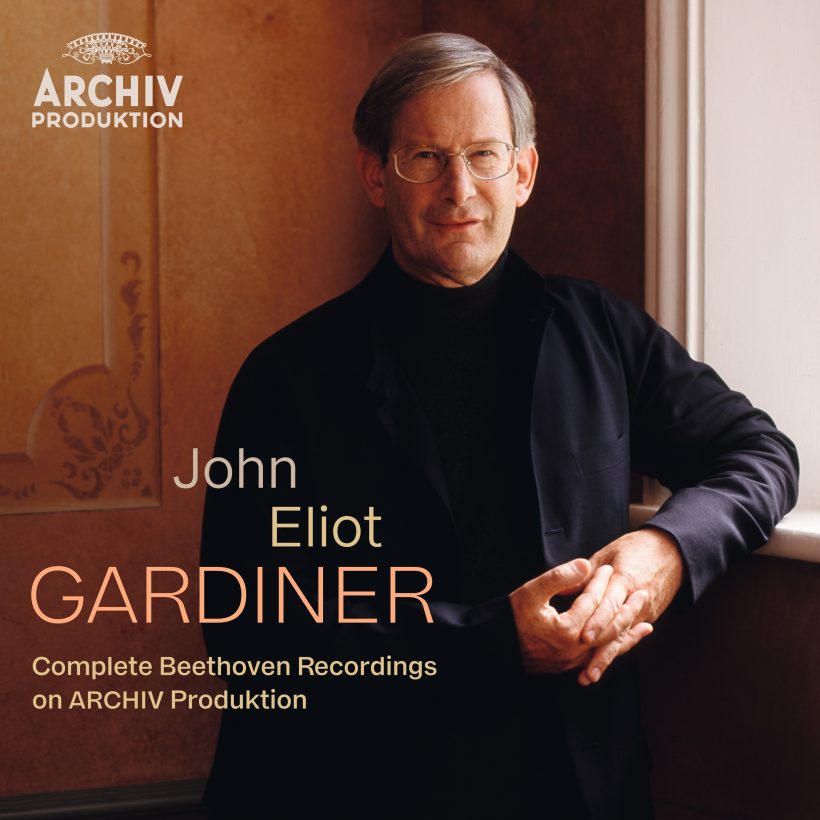John Eliot Gardiner Releases ‘Complete Beethoven Recordings’ Box Set
John Eliot Gardiner’s ‘Complete Beethoven Recordings’ have been brought together for the first time to mark Beethoven’s 250th birthday in 2020.

Sir John Eliot Gardiner’s Complete Beethoven Recordings made for Archiv Produktion have been brought together for the first time to mark Beethoven’s 250th birthday in 2020. This 15-CD set features the Orchestre Revolutionnaire et Romantique and the Monteverdi Choir under the leadership of John Eliot Gardiner with soloists Robert Levin and Viktoria Mullova in the Piano and Violin Concertos. The Complete Beethoven Recordings include a bonus disc, never before commercially released, featuring an interview with Gardiner discussing the symphonies, and new liner notes written by Thomas Otto.
Listen to Clive Paget, Editor of Australia’s Limelight magazine, explaining why John Eliot Gardiner’s Beethoven symphony cycle, recorded on period instruments 25 years ago, “crackles with the radical energy of the early nineteenth-century in a way that is totally unique.”
The great French conductor François-Antoine Habeneck and his Orchestre de la Société des Concerts du Conservatoire pioneered accurate and responsible Beethoven interpretation in the 1830s and set the standard for later period-informed performances. Like Habeneck, John Eliot Gardiner was merciless in rehearsal and scrupulously faithful to the original manuscript. In 1989, the Missa Solemnis on Archiv was to reveal “Gardiner’s Beethoven credentials” and the Mass In C Minor was to reaffirm his “genius” (Gramophone).
Gardiner assures us that the use of period instruments allows the revolutionary side of Beethoven to come to the fore with distinct clarity, and has “an entirely distinctive sound which can convey the train of Beethoven’s thought more readily and more directly.”
A logical consequence of this is that his soloist for the five piano concertos, Robert Levin, decided against a concert grand and chose to perform on a fortepiano. Gardiner, who was convinced that the modern symphony orchestra could no longer be the tonal ideal for the music of Beethoven tells us that, “It was about cleaning the musical lens and stripping out the excesses of the late 19th century.” Thus, in the symphonies, the listener is taken aback at the revolutionary force of Beethoven’s language and reminded once again of the ferocious intensity that must have shell-shocked 19th-century Viennese audiences.
John Eliot Gardiner’s Complete Beethoven Recordings include:
CD1: Symphony No. 1, op. 21
Symphony No. 2, op. 36
CD2: Symphony No. 3, op. 55 “Eroica”
Symphony No. 4, op. 60
CD3: Symphony No. 5, op. 67
Symphony No. 6, op. 68 “Pastoral”
CD4: Symphony No. 7, op. 92
Symphony No. 8, op. 93
CD5: Symphony No. 9, op. 125 “Choral”
CD6: Piano Concerto No. 2, op. 19
Rondo for Piano and Orchestra
Piano Concerto No. 1, op. 15
CD7: Piano Concerto No. 3, op. 37
Piano Concerto No. 4, op. 58
CD8: Piano Concerto No. 5. Op. 73 “Emperor”
Fantasia for piano, chorus and orchestra, op. 80
CD9: Piano Concerto No. 4, op. 58 for piano and strings quintet
Symphony No. 2, op. 36 chamber version for violin, piano and violoncello
CD10: Violin Concerto, op. 61
CD11: Missa Solemnis, op. 123
CD12: Mass in C, op. 86
CD13-14: Leonore, op. 72
BONUS
CD15: Sir John Eliot Gardiner talks about the symphonies featuring musical examples.
John Eliot Gardiner’s Complete Beethoven Recordings can be bought here.










